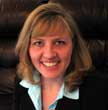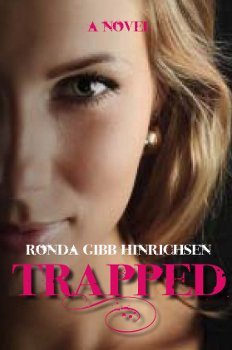Search
Categories
Browse By
Special Lists
Features
Interviews
Book Giveaways
Events
Author Interview with Ronda Gibb Hinrichsen
June 12, 2010
Today we have the privilege of interviewing Ronda Gibb Hinrichsen, author of two YA/adult romantic suspense novels, Missing and Trapped. |  |
Welcome to The Hope Chest Reviews, Ronda.
1. When did you first know that you wanted to be a writer?
I was in the 6th grade. My teacher was reading S.E. Hinton's The Outsiders to the class, and when she reached the section where Johnny urged Ponyboy to stay "gold" I realized I wanted to write "golden" words just as Hinton had. By that, I mean I not only want to write well, but I also want to encourage the "golden"-the goodness-in my readers.
2. Who or what has inspired you the most in your writing career and in what way?
My professor from college, Dorla Jenkins. I dedicated my first novel, Missing, to her. One of the lessons I learned from her was "Your value is in your individuality." I remember it as relating to voice, but it also applies to who we are as individuals. We're all unique, and that "uniqueness" in writing is what sells. It's also true for non-writers. After all, if everyone could do everything, would anyone feel needed?
3. Who are some of your favorite authors?
I enjoy Twilight because Meyers has the ability to make her readers feel/experience her stories, not just see them. I also love Rowling's imagination behind the Harry Potter series. But my most favorite authors are the "old" English writers, like Jane Austin and Charlotte Bronte.
4. I understand that Missing was your first published novel. Could you tell us a little bit about it?
Missing is about a BYU-Idaho student who's on a choir tour in British Columbia when she sees a missing child from her own hometown. The story is the race to save the girl with a bit of romance along the way.
5. How long did it take from the time you started writing Missing until it was released?
I don't remember the exact year I started writing Missing, but it took about three years because it was the first novel I'd ever attempted to write. I had written for magazines before that, but I didn't know the structure and rules related to novels. Getting Missing published? Over a year before it was finally accepted. It was published about 9 months after that.
6. Do you have any advice for other new authors who may be trying to get published?
Learn your craft, study the market so you have an idea of what is selling, write what interests you within those parameters, and then submit, submit, submit.
7. In the acknowledgements of your current novel, Trapped, you mention that it was the result of two vivid dreams. Could you tell us a little bit about the dreams that inspired you to write the book?
The first was about a man being wrongly accused of setting a deadly trap for his daughter and then confessing to the crime in order to save his wife and child. The second was a fantastical scenario that is pretty much the climax of Trapped. One of the great things about that dream was it gave me all my characters and their motivations.
8. Trapped primarily takes place in Austria which is a rather unique setting. Have you visited the country or do you have your own family ties there?
My husband and I took our children there about three years ago, and I loved it. It's now one of my favorite destinations. It also has so many forests that it seemed perfect for my story.
9. Did you have to do a lot of research to write Trapped, or was it mostly a product of your own imagination?
Both. I always research as much as I can to try to get the setting and logistic details correct, even those I'm pretty sure of because my memory might have a few glitches. But the story and characters are entirely a product of my imagination.
10. What was the most challenging part of writing Trapped?
I loved writing this story. It's different than anything I've ever written before, and it really captured my imagination. I also feel it helped me grow as a writer. But it wasn't harder. In fact it was easier, than writing Missing. So, I'd have to say the most challenging part was the final revision/preparing for publication process. My publisher accepted Trapped for publication in February of this year, expecting to publish it later this summer or fall, but to my surprise-and my editor's-the publisher decided to put it out in April, which eventually became May 1st. That process required almost day and night back and forth proofing of edits for several weeks. That was tough.
11. What was your favorite part of writing Trapped?
I loved mixing unlike things, in this case, realism and fantasy. Mixing unlike things was something I'd occasionally done in my essays back in high school and college and had always figured was a kind of weird thing to do. But now I see it as an undeveloped talent I can continue to work on. That's back to "Your Value is in your individuality."
12. What made you decide to write Trapped in first-person point-of-view?
I wrote Missing in 3rd person and began to write Trapped in 3rd person, too. But after I'd made it to the second or third chapter, I found that I kept hearing Emi's voice and slipping into 1st person, so I decided to try it. I found I really liked it. On further scrutiny, I realized I had to keep it mostly in first person because I wanted the reader to be as clueless to Emi's situation as Emi was, especially in relation to who the bad guy was. However, early on in the book, I also wanted the reader to realize Emi was not only being enticed into a trap but she was also being watched by a dangerous enemy. That was the purpose behind my brief step into third person.
13. In some ways, Trapped had the feel of a young adult novel, and I noticed on your website that you have done speaking engagements in schools. Was Trapped written with a teenage audience in mind, or was it written primarily for adults while being suitable for a younger audience as well?
Both Trapped and Missing are intended to be cross-over novels, meaning they are appropriate and enticing to both teens and adults. That's what I like to read, so that's what I want to write. Two of my favorite novels are Jane Eyre and Pride and Prejudice. Both are appropriate for and enjoyed by both teens and adults.
14. Both of your books have a suspense element. What made you choose to write romantic suspense stories rather than a different sub-genre of romance?
Again, one of the writing "rules" is to write what you read. Romantic suspense is what excites my imagination. I'm also discovering that I have a talent for suspense, so I decided why not utilize it while I work on my "romance" skills?
15. What are you currently working on?
I'm writing a historical, romantic suspense novel, currently titled Fallen. It, like Missing, is in 3rd person.
Thank you so much for visiting with The Hope Chest Reviews today, Ronda. It has been a pleasure interviewing you, and we wish you all the best.
 | Read our review of Trapped. |
Latest Reviews
- To Command and Collar
by Cherise Sinclair - The Virgin and the Playboy (1Night Stand #2)
by Kate Richards - When Darkness Comes
by Alexandra Ivy - Living Dead in Dallas
by Charlaine Harris - Brief Cases
by Jim Butcher
